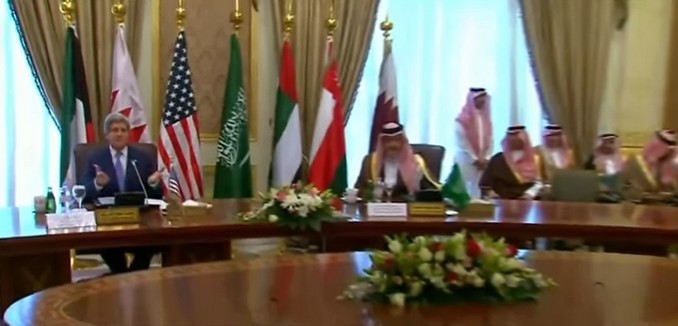Secretary of State John Kerry was in Riyadh, Saudi Arabia on Thursday in an attempt to “to ease Gulf Arab concerns about an emerging deal [with Iran] and discuss ways to calm instability in troubled Yemen and other Mideast nations.” Since the signing of the Joint Plan of Action (JPOA) in November 2013, the Gulf States and Israel have expressed increased concerns over Iran’s nuclear program, its support for terrorism, and quest for regional dominance according to an article (Google link) last month in The Wall Street Journal. In the wake of the JPOA, an unnamed Saudi official said, “The Saudi government has been very concerned about these negotiations with Iran and unhappy at the prospect of a deal with Iran.” Saudi Arabia worries “that any deal reached would mean Iran would widen their influence in the region.”
Since November 2013, Iran has expanded its role in Syria, Iraq, Lebanon, and Yemen, further escalating regional fears. The New York Times reported this week that in the operation currently underway to retake the Iraqi city of Tikrit “Iranian-backed Shiite militia leaders said that their fighters made up more than two-thirds of the pro-government force of 30,000.” When interviewed by The Times, Landon Shroder, an intelligence analyst, declared that “[b]y this stage, everybody who observed what happened in Iraq with the Islamic State should know that the main influencer in Iraq is Iran.” In his press conference with Secretary Kerry on Thursday, Saudi Foreign Minister Prince Saud al-Faisal, declared, “Tikrit is a prime example of what we are worried about. Iran is taking over the country.”
In his speech before Congress on Tuesday, Israeli Prime Minister Benjamin Netanyahu raised the alarm over the potential effects of a nuclear armed and increasingly aggressive Iran, saying that the current potential “deal that’s supposed to prevent nuclear proliferation would instead spark a nuclear arms race in the most dangerous part of the planet.” Michael Singh, Managing Director and Senior Fellow at the Washington Institute for Near East Policy wrote in February that “[the terms of the reported deal] would certainly give every incentive to states which see Iran as their regional rival or as threatening to pursue matching [nuclear] capabilities if not greater capabilities.”
[Photo: ARIRANG NEWS / YouTube ]




